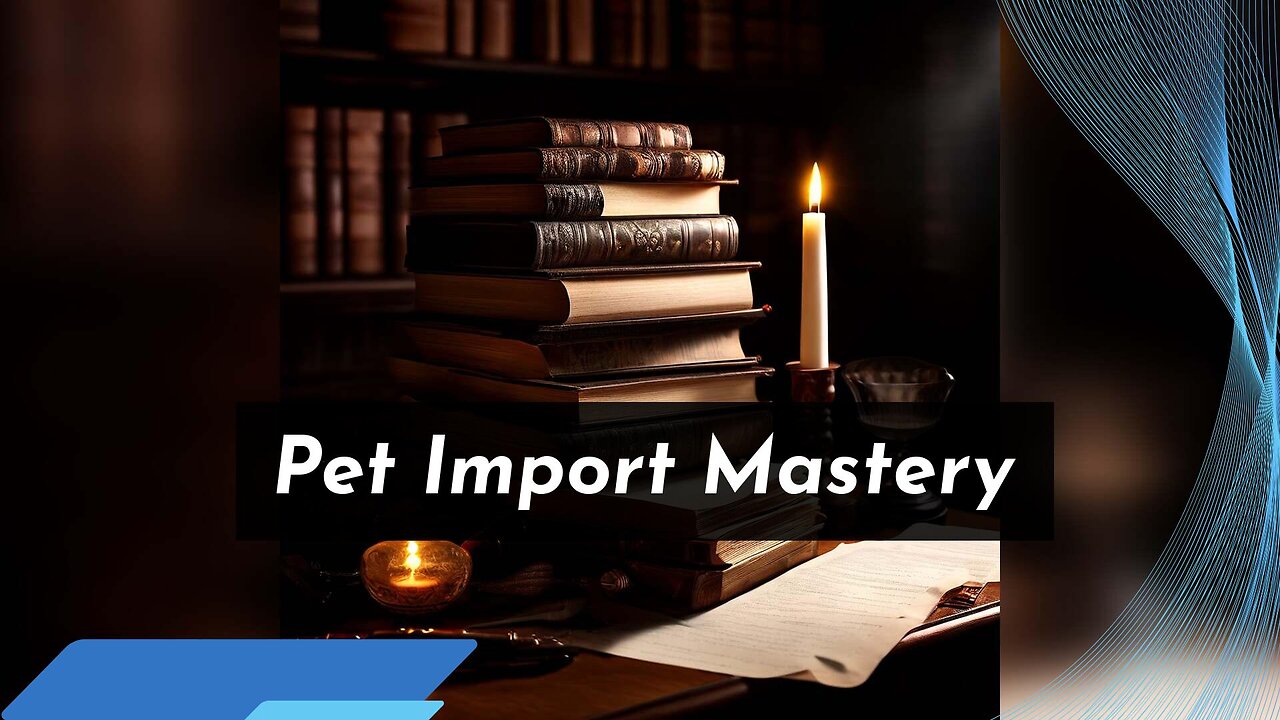Premium Only Content

Navigating the Pet Supplies Import Process: Tips and Tricks for Success!
ISF Solution | (832-904-9333)
clearance@isfsolution.com | www.isfsolution.com
Importing goods for the pet supplies or pet food industry can be a complex process that involves navigating customs regulations and requirements. The first step is to thoroughly research and understand the customs regulations of the destination country. These regulations can include restrictions on ingredients, packaging standards, labeling requirements, and health and safety certifications.
To simplify the import process and ensure compliance with customs regulations, it is highly recommended to work with a customs broker. Customs brokers are licensed professionals who specialize in customs procedures and have in-depth knowledge of the customs regulations of different countries. They can assist with preparing the necessary documentation, such as customs bonds, import permits, and licenses, and guide you through the customs clearance process.
When importing goods, including pet supplies and pet food, a customs bond is often required. A customs bond is a financial guarantee that ensures the payment of customs duties, taxes, and other charges to the customs authorities. It can be obtained from a licensed surety company or insurance provider and must be filed with the customs authorities before importing goods. Your customs broker can help you obtain the appropriate customs bond to meet the requirements of the destination country.
For shipments entering the United States, it is essential to file an Importer Security Filing (ISF) before the goods are loaded onto a vessel. The ISF requires importers to provide information about the imported goods, such as shipper names and addresses, consignee information, commodity descriptions, and container stuffing location. This filing must be done at least 24 hours before the vessel's departure to avoid penalties or delays. Working closely with your customs broker, you can ensure a timely and accurate ISF filing.
In addition to understanding customs regulations, it is important to explore international trade agreements that may provide benefits for importers in the pet supplies or pet food industry. These agreements can reduce or eliminate customs duties, streamline customs procedures, and facilitate trade between countries. By taking advantage of these agreements, you can potentially save on import costs and increase competitiveness in the market.
Importing goods for the pet supplies or pet food industry requires careful planning and compliance with customs regulations. By conducting thorough research, working with an experienced customs broker, obtaining the necessary customs bonds, filing the Importer Security Filing (ISF), and leveraging international trade agreements, you can successfully navigate the import process. Stay updated on customs regulations and maintain a good relationship with your customs broker and other relevant authorities to ensure a smooth and efficient import process.
#usimportbond #isfcustomsbroker #uscustomsclearing #isfentry
Video Disclaimer Here: For educational purposes - No affiliation with US government sectors.
00:42 Research and Understand Customs Regulations: Familiarize yourself with the specific rules and requirements of the destination country regarding ingredients, packaging, labeling, and certifications for importing pet supplies or pet food.
1:14 Work with a Customs Broker: To simplify the import process and ensure compliance, collaborate with a licensed customs broker who can assist in preparing necessary documentation, guiding through customs clearance, and minimizing errors.
1:50 Obtain Customs Bonds: Secure a customs bond from a licensed provider to guarantee payment of duties, taxes, and charges to customs authorities when importing goods, including pet supplies and pet food.
2:28 File Importer Security Filing (ISF): For shipments entering the United States, submit an ISF at least 24 hours before vessel departure to provide essential information about the imported goods and prevent penalties or delays.
-
 1:53:43
1:53:43
Nerdrotic
6 hours ago $0.27 earnedMysteries of 3I/ATLAS | Forbidden Frontier #113
41.6K4 -
 2:04:21
2:04:21
vivafrei
1 day agoEp. 278: D.C. Peace Wave! Big Tish & Nipple Judge SPANKED! "Maryland Man" Trafficker FREE & MORE?
90.7K114 -
 LIVE
LIVE
Damysus Gaming
2 hours agoBorderlands 3 - Part 8 - FL4K Time | Children of the Vault be Warned!
55 watching -
 1:30:28
1:30:28
Patriots With Grit
6 hours agoWhat You Should Know About Harmful Vaccine Ingredients And What To Say To Your Doctor, Pediatrician, Health Department or School When They Pressure You, Your Kids Or Your Family Members | Dr. Bryan Ardis, D.C.
11.7K5 -

This is the Ray Gaming
2 hours ago $0.01 earnedSunday Night Live with the Boys | Rumble Premium Creator
6.38K -
 2:02:16
2:02:16
ItsMossy
3 hours ago🍃NEW MIC WHO THIS🍃DRIVING SIM GO BRRR🍃420 SESH🍃
3.86K1 -
 LIVE
LIVE
THOUGHTCAST With Jeff D.
2 hours agoSunday night Fortnite With ScottishVikingGaming & crew
27 watching -
 3:11:45
3:11:45
a12cat34dog
3 hours agoSOLID DAWG RETURNS :: METAL GEAR SOLID :: 1998 IS UNFORGIVING {18+}
6.94K1 -
 4:02:55
4:02:55
yellow_1ron
5 hours agoGAMING WITH THE HOMIES JOIN UP | JOIN!
7.97K -
 1:52:25
1:52:25
JohnnyDrop
3 hours agoJOHNNY DROP | Let's get to 100 Followers | Warzone / PGA / Question of the Day
6.72K1